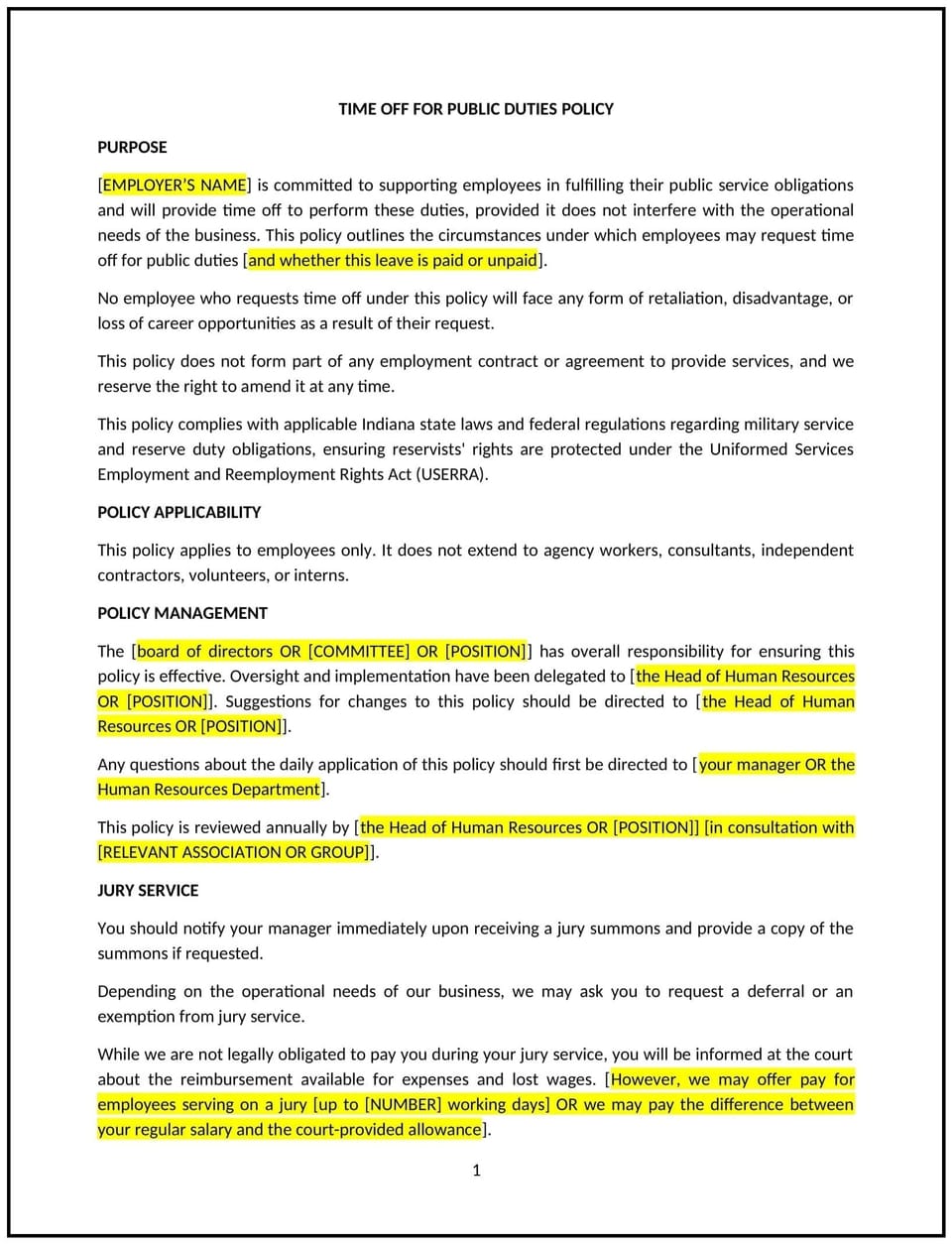Time off for public duties policy (Indiana): Free template

Time off for public duties policy (Indiana): Free template
This time off for public duties policy helps Indiana businesses provide guidelines for employees who need to take time off to fulfill public responsibilities, such as serving on a jury, attending court as a witness, or participating in other civic duties. It outlines the types of eligible activities, procedures for requesting time off, and expectations for maintaining workplace continuity.
By implementing this policy, Indiana businesses can support employees in fulfilling their public responsibilities while minimizing workplace disruptions.
How to use this time off for public duties policy (Indiana)
- Identify eligible public duties: Specify the types of public duties covered by the policy, such as jury service, court appearances as a witness, attending civic hearings, or participating in public commissions.
- Outline the request process: Provide clear instructions for employees to request time off, including the notice period, required documentation (e.g., jury summons or court order), and the process for approval.
- Address paid and unpaid leave: Clearly state whether time off for public duties will be paid or unpaid and include details about any applicable laws or collective agreements that may influence compensation.
- Maintain operational continuity: Encourage employees to discuss their absence with their manager in advance to ensure that responsibilities are managed effectively during their time away.
- Include return-to-work procedures: Outline how employees should resume work after completing their public duties, including notifying their manager of their availability.
- Provide guidelines for extended absences: Address how the business will handle extended absences due to lengthy public duties, such as extended jury service.
- Comply with legal requirements: Reference relevant Indiana and federal laws regarding employee rights for time off for public duties to ensure alignment.
- Review and update regularly: Periodically review the policy to ensure it reflects current legal requirements and workplace practices.
Benefits of using this time off for public duties policy (Indiana)
Implementing this policy provides several key benefits for Indiana businesses:
- Supports civic engagement: Allows employees to participate in public duties without fear of losing their job or facing workplace repercussions.
- Enhances legal compliance: Aligns with Indiana laws regarding employee rights for time off to fulfill public responsibilities.
- Promotes fairness: Establishes consistent guidelines for handling time-off requests for public duties.
- Maintains workplace continuity: Provides a structured approach for managing employee absences, reducing disruptions to business operations.
- Builds goodwill: Demonstrates the business’s support for employees' civic responsibilities, fostering a positive workplace culture.
- Reduces conflicts: Minimizes misunderstandings by setting clear expectations for time off and return-to-work procedures.
Tips for using this time off for public duties policy (Indiana)
- Communicate the policy: Share the policy with all employees during onboarding and ensure it is easily accessible in the employee handbook.
- Encourage early communication: Remind employees to notify their manager as soon as they are aware of their need for time off for public duties.
- Maintain clear documentation: Require employees to provide relevant documents, such as a jury summons or court order, to support their time-off request.
- Plan for coverage: Work with managers to allocate tasks or reassign responsibilities during the employee’s absence to maintain operational continuity.
- Monitor legal updates: Stay informed about changes to Indiana laws related to employee time off for public duties to ensure the policy remains compliant.
- Address employee concerns: Provide opportunities for employees to ask questions or seek clarification about the policy and how it applies to their situation.
Q: What types of public duties are covered by this policy?
A: Eligible public duties may include jury service, attending court as a witness, participating in public commissions, or serving on civic committees.
Q: Is time off for public duties paid or unpaid?
A: This depends on the company’s policy and any applicable Indiana laws. Businesses should clarify whether employees will receive compensation during their absence.
Q: What documentation is required to request time off for public duties?
A: Employees should provide documents such as a jury summons, court order, or other official notices to support their time-off request.
Q: How much notice should employees provide when requesting time off for public duties?
A: Employees should notify their manager as soon as they are aware of their obligation, ideally providing at least a few days' notice unless circumstances prevent it.
Q: How should businesses handle extended absences for public duties?
A: Businesses should work with the employee to manage their responsibilities during an extended absence and plan for their return once the public duty is completed.
Q: Can businesses refuse an employee’s request for time off for public duties?
A: Businesses must comply with Indiana and federal laws that protect employees’ rights to participate in certain public duties, such as jury service.
Q: What should employees do after completing their public duties?
A: Employees should notify their manager of their availability and follow the company’s return-to-work procedures.
Q: How often should the policy be reviewed?
A: The policy should be reviewed annually or whenever there are changes to Indiana laws or workplace practices related to public duties.
This article contains general legal information and does not contain legal advice. Cobrief is not a law firm or a substitute for an attorney or law firm. The law is complex and changes often. For legal advice, please ask a lawyer.


